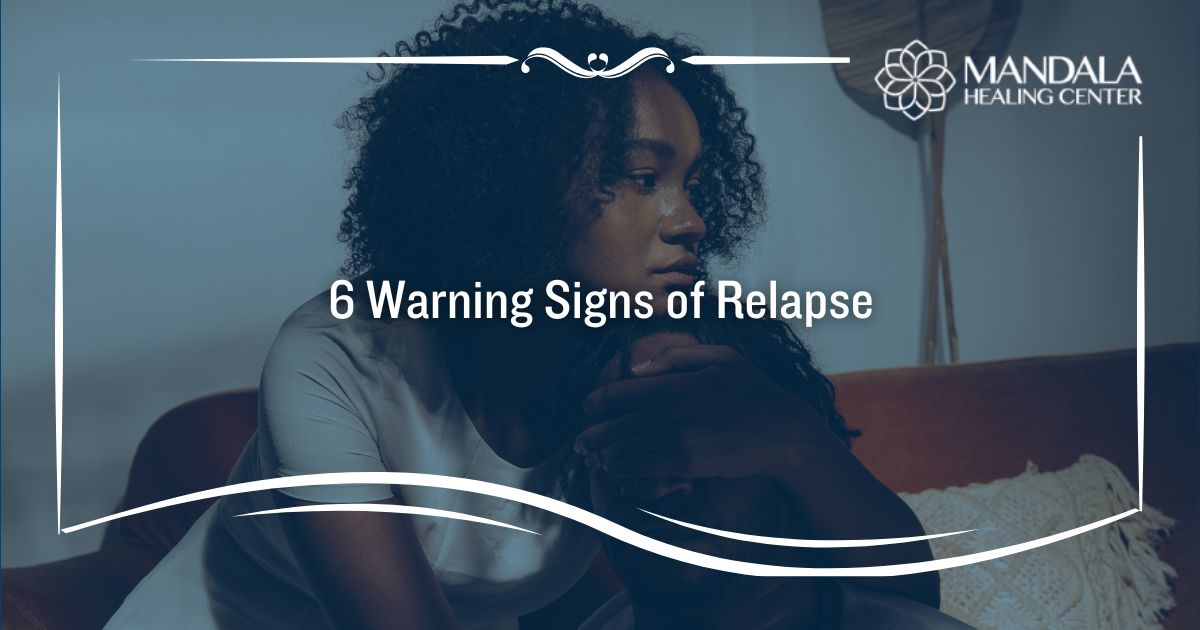Addiction is a chronic and progressive disease that affects millions of Americans each year. According to the Substance Abuse and Mental Health Services Administration (SAMHSA), 48.7 million people struggled with a substance use disorder in 2022.[1]
If you have suffered from addiction, you might have attended a drug rehab program. Once you complete the process, you can feel like all your work is done. Unfortunately, because addiction is chronic, you have to continue to work on bettering yourself each day to remain sober.
You could be at risk of relapsing once you stop engaging in the activities and services that kept you afloat. To explain, a relapse is characterized by returning to drug or alcohol use after a period of abstinence. If you or a loved one is recovering from a substance use disorder, you might be wondering how to tell if a relapse is likely.
The main warning signs of relapse include overconfidence in your sobriety, missing meetings or ending therapy sessions, experiencing increased mental health symptoms, social isolation, and more.
In this article, you will learn:
- How common relapse is among recovered addicts
- What are the stages of relapse
- What are the common warning signs of relapse
What are the Six Warning Signs of Relapse?
Unfortunately, relapse is common among recovered addicts and alcoholics. According to the National Institute on Drug Abuse (NIDA), the relapse rate is between 40 to 60%.[2]
One common misconception about relapse is that it only includes the act of abusing substances. However, relapse actually occurs in three stages: emotional relapse, mental relapse, and physical relapse. If you can recognize an emotional or mental relapse before it turns physical, you can prevent yourself from experiencing one.
The top six warning signs of relapse include:
1. Neglecting Recovery Maintenance Tools
When you are recovering from addiction, there are tools and services you partake in to ensure you stay focused and connected to recovery. For example, you might attend weekly support groups like 12-step meetings, engage in regular therapy, and contact a sponsor for support.
A major sign of relapse is starting to lessen your participation in these activities. Have you been missing meetings? Did you decide that you don’t need therapy anymore?
If so, this might be a relapse warning that you shouldn’t avoid. You should engage in the relapse prevention plan that you created with your therapist while you were in treatment.
2. Overconfidence
Another sign of mental relapse is overconfidence in your recovery. While it is good to feel secure in your sobriety, it is possible to be too confident. If you are beginning to feel like you are at a level of recovery where you do not need any more help, you might be close to a relapse.
Overconfidence can lead to complacency, which is a huge sign of relapse. Once you are complacent, you will stop engaging in the tools that kept you sober in the first place. If you start feeling this way, it’s important to reach out to a trusted friend or sponsor for advice and support.
3. Increased Mental Health Symptoms
Depression, anxiety, stress, and mood swings are all emotions that can trigger a relapse. If you are experiencing these symptoms more frequently, you might be in trouble.
An increase in mental health symptoms is a clear sign of emotional relapse. If you do not address these issues with therapy or healthy coping mechanisms, you could begin to fantasize about using substances to cope with them.
4. Social Isolation
Social isolation is a common trigger for relapse. Once you are close to returning to your substance abuse, you might begin to place distance between you and your loved ones. This is a maladaptive coping mechanism that people often use to lessen the harm they cause their loved ones when they relapse.
If you notice that you are spending less time with your friends and family, make plans to reconnect. Avoiding relapse often comes down to having strong connections and support from others.
5. Romanticizing Past Substance Abuse
If you begin to think about your past drug and alcohol use through rose-colored glasses, you might be on your way to a relapse. For example, you might only remember how drugs helped you numb your emotions. It is also common to only remember the nights when substances helped you have a good time while you were out with friends.
Instead of remembering how drugs and alcohol hindered your life, you are only recalling the good parts. This is a slippery slope that often causes people to return to substance abuse. To prevent relapse, you have to remember the negative things that drugs and alcohol brought into your life.
6. Revisiting Negative Connections
Have you thought about calling up your old friends who used to abuse substances with you? Maybe you want to go visit a special bar or location where you used to engage in heavy alcohol or drug abuse. If so, you might be close to experiencing a relapse.
People who are at risk of relapsing often revisit negative connections. This lays the groundwork that sets up the ability to relapse easily. If you are experiencing these thoughts or actions, it’s time to engage in healthy coping mechanisms to prevent yourself from relapsing.
Get Connected to a Top-Rated Drug and Alcohol Rehab Program
If you or a loved one suffers from a relapse, it’s time to seek professional help. At the Mandala Healing Center, we offer a combination of individualized and evidence-based treatment that will help you get back on your feet.
Contact us today for more information on our highly rated drug and alcohol addiction treatment program.
References:
- The Substance Abuse and Mental Health Services Administration (SAMHSA): HHS, SAMHSA Release 2022 National Survey on Drug Use and Health Data
- The National Institute on Drug Abuse (NIDA): Treatment and Recovery












